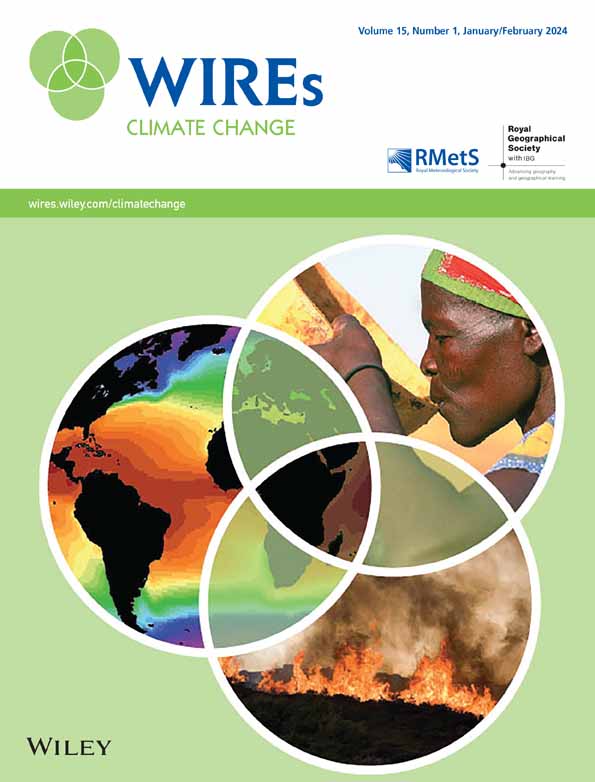撒哈拉以南非洲女性企业家面临气候风险的三重脆弱性:私营部门适应的性别障碍和推动者
IF 10.3
1区 环境科学与生态学
Q1 ENVIRONMENTAL STUDIES
引用次数: 2
摘要
企业有效适应气候变化的能力在很大程度上受到外部商业有利环境的影响。撒哈拉以南非洲的中小型企业(SME)无论企业主的性别如何,都会受到适应能力的限制。然而,性别是一个关键的社会鸿沟,适应能力的差异由此显现,在非洲,大多数企业家都是女性。我们进行了一次系统的审查,以综合现有知识,了解非洲女性企业家对气候风险的不同脆弱性,以及她们对极端气候事件的敏感性和适应能力。我们使用脆弱性分析方法综合了这些文献,该方法将脆弱性和适应能力置于气专委第五次评估报告中所述的更广泛的气候风险框架的背景下。在这样做的过程中,我们确定了私营部门适应的性别障碍和推动者,并建议女企业家面临气候变化的“三重差异脆弱性”,其中她们:(1)由于集中在某些部门和类型的企业(例如偏远地区农业部门的微型中小企业),往往对气候风险更敏感;(2) 在商业环境中面临更多的适应障碍,包括获得资金、技术、(气候和适应)信息和支持政策;和(3)也经常同时站在家庭层面管理气候风险的前线。由于各种形式的不平等往往会造成歧视和脆弱性的复合体验,我们特别关注差异脆弱性因素如何交叉、放大和再现。本文章由计算机程序翻译,如有差异,请以英文原文为准。
The triple differential vulnerability of female entrepreneurs to climate risk in sub‐Saharan Africa: Gendered barriers and enablers to private sector adaptation
The ability of businesses to adapt effectively to climate change is highly influenced by the external business enabling environment. Constraints to adaptive capacity are experienced by small and medium enterprises (SMEs) across sub‐Saharan Africa, regardless of the gender of the business owner. However, gender is a critical social cleavage through which differences in adaptive capacity manifest and in Africa most entrepreneurs are women. We conduct a systematic review to synthesize existing knowledge on differential vulnerability of female entrepreneurs in Africa to climate risk, in relation to their sensitivity to extreme climate events and their adaptive capacity. We synthesize this literature using a vulnerability analysis approach that situates vulnerability and adaptive capacity within the context of the wider climate risk framework denoted in the IPCC Fifth Assessment Report. In doing so, we identify gendered barriers and enablers to private sector adaptation and suggest women entrepreneurs face a “triple differential vulnerability” to climate change, wherein they: (1) are often more sensitive to climate risk, as a result of their concentration in certain sectors and types of enterprises (e.g., micro SMEs in the agricultural sector in remote regions); (2) face additional barriers to adaptation in the business environment, including access to finance, technologies, (climate and adaptation) information and supportive policies; and (3) are also often concurrently on the frontline of managing climate risk at household levels. Since various forms of inequality often create compounding experiences of discrimination and vulnerability, we pay particular attention to how factors of differential vulnerability intersect, amplify, and reproduce.
求助全文
通过发布文献求助,成功后即可免费获取论文全文。
去求助
来源期刊

Wiley Interdisciplinary Reviews: Climate Change
METEOROLOGY & ATMOSPHERIC SCIENCES-
CiteScore
20.00
自引率
2.20%
发文量
58
审稿时长
>12 weeks
期刊介绍:
WIREs Climate Change serves as a distinctive platform for delving into current and emerging knowledge across various disciplines contributing to the understanding of climate change. This includes environmental history, humanities, physical and life sciences, social sciences, engineering, and economics. Developed in association with the Royal Meteorological Society and the Royal Geographical Society (with IBG) in the UK, this publication acts as an encyclopedic reference for climate change scholarship and research, offering a forum to explore diverse perspectives on how climate change is comprehended, analyzed, and contested globally.
 求助内容:
求助内容: 应助结果提醒方式:
应助结果提醒方式:


